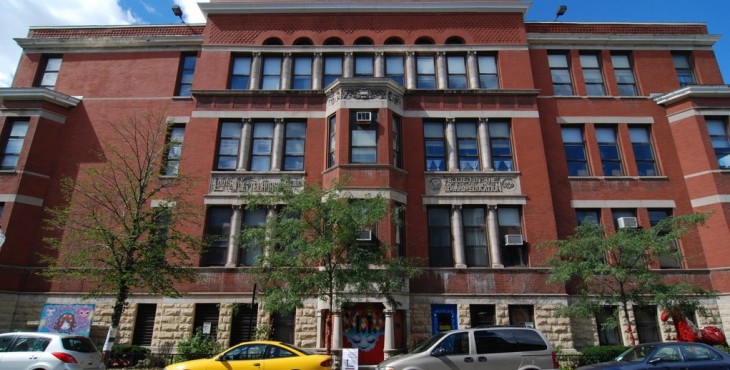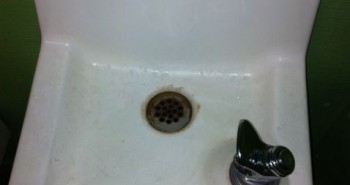My friend who is a janitor in the Chicago Public Schools told me that he warned his daughters to only use the bathrooms at school if they have to. He said, “I know how impossible it is to get our schools clean right now. It just can’t be done with the cutbacks.”
Can you imagine telling your child that school is too dirty to safely use the toilet?
Last March the Chicago Schools contracted with two private cleaning management companies, Aramark and Sodexomagic. Since the privatization filth has become the new normal in our schools. A recent article in Catalyst, a respected education news source in Chicago, outlines the results of a survey conducted by a group of Chicago principals.
This story has been told in several venues with nationwide coverage from Valerie Strauss in the Washington Post and Diane Ravitch. Last June the Chicago Teachers Union surveyed all of its members and received over 1,000 responses. The report the union generated outlines the worsening conditions in our schools and a strong picture how consistent inattention to building cleanliness mounts towards conditions of filth.
And the stories we hear range from the unpleasant to the downright creepy. A teacher told me that young students were sitting on their rug listening to a story and mice ran across their laps. The class had to be moved to another room in the building. Others talk about garbage not being collected, toilets left unclean, and carpeting seldom vacuumed.
All of the coverage so far, though, has been focused on building conditions and mismanagement. I see yet another side of this issue – workers’ rights. The privatization of the work has made it almost impossible for workers to do their jobs. The hours and personnel in each building were cut drastically, and to make matters worse, Aramark just laid off 468 janitors last week.
I dearly love the custodian who works in my classroom. We have been together for the last 8 years, and our work lives and personal lives intertwine. Our sons are the same age and just entered high school. Every evening we talk about our days, and our lives as we tidy up our classroom and prepare lessons for the next day. Both of us love and care for the children in our school, and we care about each other. Yet, it is this love for our school and our children that is breaking my fellow worker’s back and heart.
Our school building was built in 1895 and is filled with charm. It was built back in the day when schools were temples – solid red brick, ornate cornices, high ceilings, and beautiful wood floors. What makes our building charming also makes it difficult to keep clean. There are plenty of nooks and crevices, the plumbing is ancient, and we have 4 floors with no elevator. In our building we have been cut back to 2 evening janitors in a school with over 800 students. It is not humanly possible to get everything done required to keep a building minimally clean under these conditions.
This is part of a trend called lean production. It happens when workers are given so much to do that they cannot possibly get their work done. It is a system built on exhaustion and failure. When a worker complains or asks for support they are shown the door. And because the worker was given an impossible task in the first place, it is easy for management to prove the workers’ incompetence.
Many educators reading this piece will recognize these working conditions. We have all been given too much to humanly do, and then we are blamed for failure. I ask that the educators in buildings who see this happening to their fellow custodial workers stand with them in solidarity and help fight against these conditions.
As for now, I bought a vacuum for my classroom. I feel like I am teaching in the one room schoolhouse days when teachers’ duties included keeping the wood stove going and sweeping the floor. But I love my students too much to ask them to sit on a dirty rug while I read to them. And I love my building janitor too much to have her feel guilty that my classroom was yet another place she could not get to that night.
This is one more instance where our schools are being used as centers for profit, and it is time to speak up against it and support our fellow workers.
Michelle Strater Gunderson is a 26 year teaching veteran who teaches fourth grade in the Chicago Public Schools. She is a doctoral student at Loyola University in Curriculum and Instruction.






howardat58
They did this in the hospitals in the UK some 20 years ago. The rise in hospital acquired infection was alarming, to the medics at least.
Maureen Fratantoni
Amen! And speak up we have been and shall continue to do so. I brought this subject up at a conversation with a news media member and out Superintendent and the Super agreed with what I was saying. Our schools are going through the same thing. Thank you for speaking out. I will share this piece.
Maureen Fratantoni
correction- our Superintendent
Jennifer
Fantastic reporting Mrs. Gunderson. This is an unacceptable business practice. I would love to know the rate at which kids are coming down with illnesses due to germs not being eliminated by proper cleaning. Does anyone know any statistics on if more kids in CPS are missing school on a regular basis due to illness?